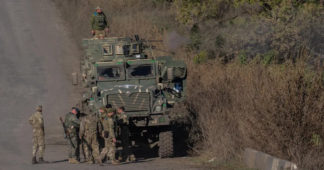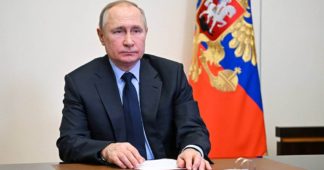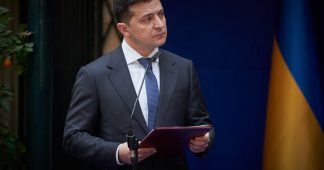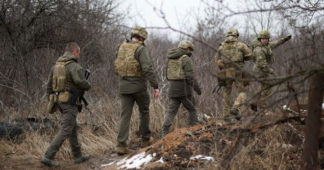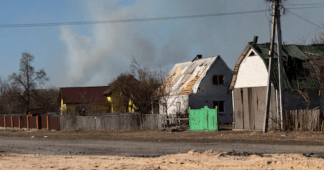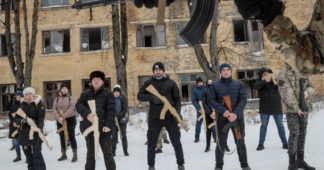Notorious former football hooligan Denis Nikitin runs a controversial unit actively engaged alongside Ukraine forces
By Shaun Walker in Kyiv
21 Sep 2023
Denis Nikitin arrived for an interview at a Kyiv restaurant with a pistol strapped to his side and flanked by two armed bodyguards. It would not have been a surprising sight in wartime Ukraine but for one detail: Nikitin is Russian.
Before Vladimir Putin’s invasion of Ukraine last year, Nikitin was known as a notorious Russian nationalist, who built links between far-right groups across Europe and was once a major figure on Russia’s football hooliganism scene.
“If we had met 10 years ago on the outskirts of Luton we might have had a fight. But now I’m a grownup,” he said, dressed all in black, as the two bodyguards glowered from a short distance away.
These days, Nikitin runs the Russian Volunteer Corps (RDK, to use its Russian abbreviation), a controversial unit of Russian citizens that fights alongside the Ukrainian army.
RDK, along with another group of Russians fighting on Kyiv’s side, performed several cross-border raids earlier this year, briefly seizing villages inside Russia before retreating back into Ukraine.
The raids – captured in chaotic, high-energy videos posted online – provided a huge PR boost for Kyiv, showing that the Kremlin could not control Russia’s borders and is vulnerable to partisan attacks. Russian authorities labelled RDK “terrorists” and subjected Ukrainian cities to a heavier-than-usual bombardment of missiles in response.
Ukrainian officials suggest that after the full military defeat of Russia and the collapse of the Putin system, RDK and units like it could be part of a pro-Ukrainian force that marches into Russia, perhaps seizing permanent control of parts of Russian territory.
But RDK are complicated allies for Ukraine. Many of its members have far-right views. Nikitin, who grew up in Russia and Germany, has been banned from the Schengen zone since 2019 and has a reputation as one of Europe’s most notorious neo-Nazis. He goes by the name White Rex, also the name of a brand of clothing he set up that uses far-right imagery.
He has lived in Kyiv since 2017, a year after he and other Russian hooligans took part in violent clashes with England fans in Marseille in 2016. From Kyiv, Nikitin ran a series of mixed martial arts competitions credited with bringing together far-right activists from across Europe.
The way Nikitin told it, he has become more anti-Kremlin as the years went by.
“We realised that immigrants are not the ultimate evil; our state is our enemy. We realised we have to fight the state,” he said at the restaurant.
When Putin launched his full-scale assault on Ukraine last year, Nikitin got his chance to fight the Russian state for real. He called friends in the Ukrainian army and asked how he could help. What started as a few Russians in Kyiv informally helping out their Ukrainian friends gradually turned into the nucleus of a battalion.
The first mission into Russia came in early March.
“It was an intoxicating sensation, once we crossed the border for the first time … It was, like, on one hand, this is the Motherland but on the other hand, it’s enemy land,” he said. He claimed his fighters all took “an extra last-resort grenade” in case of capture, aware that torture or worse awaited them if they ended up in the hands of the Russian authorities.
Nikitin speaks perfect English and is clearly enjoying his newfound time in the limelight but his jovial demeanour can change quickly. A German journalist who tracked down his relatives to ask questions about Nikitin’s past “will pay for his work one day”, he said. In a courtroom? “In a court, first. Let’s see how it goes in court. Let’s put it like that.”
Continue reading at www.theguardian.com
We remind our readers that publication of articles on our site does not mean that we agree with what is written. Our policy is to publish anything which we consider of interest, so as to assist our readers in forming their opinions. Sometimes we even publish articles with which we totally disagree, since we believe it is important for our readers to be informed on as wide a spectrum of views as possible.
